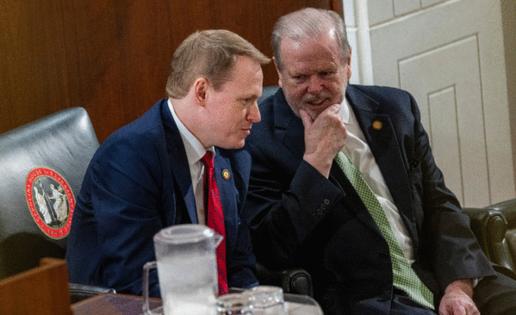North Carolina lawmakers to return soon for override votes on several bills vetoed by Gov. Josh Stein
Published in News & Features
RALEIGH, N.C. — Gov. Josh Stein’s vetoes of several bills will be tested next week when North Carolina lawmakers return to Raleigh to hold override votes.
Stein had already blocked three bills ahead of the last week lawmakers spent in session at the Legislative Building in June.
He subsequently vetoed 11 more bills that the Republican-controlled General Assembly sent him, bringing the total to 14.
On Monday, Senate leader Phil Berger announced that the Senate will reconvene July 29 to hold override votes on seven Senate bills that Stein vetoed. The Senate will also take up overrides of any House bills that manage to clear the lower chamber, Berger’s office said.
Those seven bills include a bill that would allow anyone older than 18 to carry a concealed handgun in North Carolina without obtaining a permit, and a bill that would expand cooperation requirements with U.S. Immigration and Customs Enforcement to four state law enforcement agencies.
There are also two bills that target diversity, equity and inclusion positions and programs in public education and the state’s university and community college systems; a bill that reduces the State Board of Education’s authority over charter schools; and bills that allow Duke Energy to delay previously planned carbon-emissions reductions, and block government agencies from collecting or disclosing information about members and donors of 501(c) nonprofits.
How does a veto override work?
In order to successfully defeat a veto, lawmakers need to override it in both chambers with a two-thirds majority.
Republicans control a supermajority in the Senate, but are one seat short in the House. That means that any bill being overridden through both chambers will require Republicans to secure support from at least one Democrat, or take advantage of multiple Democratic absences.
The seven other bills Stein vetoed that will need the House to vote first, on an override, have all been placed on the House’s voting calendar for July 29 as well.
A bill being put on a calendar for a certain day doesn’t necessarily mean it will be voted on that day. Leaders in both chambers often move bills around and reschedule votes, usually depending on whether all of their caucus’s members are present. During the last week lawmakers were in town in June, GOP leaders gave notice of possible override votes that were ultimately delayed due to absences in both chambers.
Berger said in a statement on Monday that Stein’s vetoes of the bills the Senate plans to take up next week “confirms that he is out of touch with the people of North Carolina.”
“He tolerates criminal illegal aliens roaming our streets, divisive ‘DEI’ concepts in our schools, and government infringement on our Second Amendment rights,” Berger said. “I look forward to leading Senate Republicans in overriding these harmful vetoes and putting North Carolina families first.”
Stein, meanwhile, argued he was blocking bills that would make the state less safe by removing the permit requirement for carrying concealed handguns, which currently entails a background check and an eight-hour safety and training course, and effectively deputizing state officers to assist ICE with its duties, drawing resources away from local law enforcement needs.
What do NC activists say about vetoes?
The 14 bills Stein has vetoed this year cover some of the most contentious issues that have been debated among lawmakers, and the public. There has been agreement between lawmakers from both parties, and in both chambers, on many other bills. As of Monday, Stein had signed into law 67 bills.
The Democratic governor’s decision to block some high-profile and controversial bills has been praised by a number of advocacy groups that have publicly called on him to take a forceful stand against GOP policies on issues like immigration enforcement, firearms, education, LGBTQ rights, and DEI policies and programs.
During a rally Monday evening, activists from several different groups commended Stein for blocking the bills, and urged lawmakers to sustain his vetoes.
Anai Santibañez, the grants and program manager at the Hispanic Federation, said the immigration enforcement bills, by expanding state and local cooperation with ICE, would erode trust within Hispanic communities, undermine public safety, and violate “basic rights.”
“ICE and police collaborations won’t keep us safe,” Santibañez said. “They create fear, they make immigrant families and already vulnerable communities less likely to report crimes, and less likely to seek help.”
Santibañez said that ICE raids and enforcement operations have caused many people living in the country without legal status and their families to live “in fear and with anxiety for months.”
“Our representatives should protect our community and not support legislation that scapegoats immigrants,” she said. “We are a part of the fabric of North Carolina, and we deserve a just and dignified treatment.”
_____
©2025 Raleigh News & Observer. Visit newsobserver.com. Distributed by Tribune Content Agency, LLC.







Comments